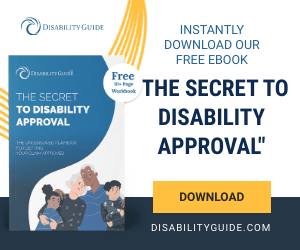About SSI & SSDI
9 Common Reasons Social Security Disability Claims Are Denied

NOTICE: Was your disability claim denied in 2019/2020/2021?
Click to see if you qualify for professional help.
Every year, millions of people apply for Social Security Disability benefits. Unfortunately, it’s extremely common (about 70 percent) for the initial claim to be denied.
There are many reasons your SSD benefits claim may be denied, and it’s important to know why yours was before you appeal. That way, you know the concerns you need to address to make sure your disability appeal is successful. You may want to consider hiring a lawyer to assist you.
Some of most common reasons for a Social Security Disability denial include:
Contents [hide]
1. You do not meet the basic non-medical requirements.
Known as a technical denial, the SSA won’t even look at your medical records if you don’t meet their eligibility requirements. For Social Security Disability Insurance (SSDI), you will receive a technical denial if you earn more than the substantial gainful activity limit of $1,090 per month or have insufficient work credits. For Supplemental Security Income (SSI), you cannot exceed the SSA’s income or asset limits.
“Some non-medical reasons people are denied benefits more apply to SSI. Because it is a welfare program, it has asset limits; you can’t have more than $2,000 in the bank as an individual or $3,000 as a couple. You can own a house and a car, but you can’t own a boat or two houses,” said Jonathan Riedel, a former employee of Social Security’s Office of Disability Adjudication and Review and a legal services coordinator at The Family Center, a nonprofit in Brooklyn, New York. “I have no statistics to back this up, but I would say the most common non-medical reasons people are denied [for SSDI benefits] have to do with failure to comply. They miss an appointment at SSA, they don’t provide the correct information about their income, they fail to report all the doctors they went to, they miss a consultative exam, they didn’t get the extra medical records that would have provided more support for their medical case, etc.”
2. Your medical condition will not last long enough (or isn’t severe enough).
Your medical condition must prevent you from working for one year or more, or result in death. If your medical condition is expected to significantly improve in less than a year or the SSA doesn’t consider your SSDI claim severe enough to keep you from working, you will receive a denial letter.
“You can be denied even when SSA acknowledges your medical conditions, usually because your medical conditions don’t preclude ALL work activity – only SOME work activity. So they deny you, because the definition of disability under SSA requires you to be unable to perform ANY ‘substantial gainful’ work activity,” said Riedel. “The reason it has these stringent criteria is because federal disability is supposed to be the final safety net in your fall down through the nets. Disabled people are not always permanently disabled, and the government (as well as your friends and family!) hopes and expects you to recover from illness and return to the workforce if you are not too young or too old. The government also wants to encourage people with disabilities not to just give up, which is a philosophy I think we can all get behind. Getting on Social Security disability is SUPPOSED to be challenging; it’s supposed to be the last recourse for a person who just can’t work, no matter what the conditions.”
3. You won’t follow your doctor’s prescribed treatment.
While there are definitely exceptions to this rule, generally the SSA will see failure to follow treatment as being unwilling to help yourself and your condition, resulting in a denied claim.
“SSA concerns itself only slightly with this matter. It’s important to realize that the government does not want to assign blame to people who become disabled, unless they are being purposefully duplicitous and fraudulent. For example, everybody’s doctors tell them to limit their intake of fried foods and sweets, yet millions of people, disabled and non-disabled, are keeping Dairy Queen in business,” said Riedel. “That said, behavior does factor a little bit into judges’ and claims reps’ decision. If the person is not TRYING to get better to regain entry into the workforce, whether or not they follow every piece of every doctor’s advice to a T, it would be hard for a thinking adjudicator to justify granting benefits.”
4. You won’t cooperate with the Social Security Administration.
If you refuse to give your local Social Security office permission to gather your medical files, miss appointments with the Disability Determination Service, or you don’t show up for consultative exams, you will be denied for benefits.
“Consultative exams are usually ordered because there is not enough medical evidence in the file to support a finding of disability. With at least one doctor telling SSA that there is a huge problem, that’s something to go on,” said Riedel. “The SSA can’t just accept your complaints about pain without an evaluation from a doctor.”
5. The Social Security Administration cannot get in contact with you.
If you move or change your phone number, you must update the SSA with your new contact information. If they cannot get a hold of you to discuss your claim, you will more than likely be denied.
6. Your disability is primarily due to drug or alcohol abuse.
You cannot receive benefits because an alcohol or drug addiction prevents you from working. Additionally, if your disabling condition is the result of drugs or alcohol, and would improve if you completely quit, you will be denied benefits. That’s not to say you can’t receive benefits for conditions caused by drugs or alcohol; it just can’t be the main contributing factor of your SSD claim.
“Drug and alcohol dependence IS a factor in your eligibility for disability, but [it] has a complicated relationship with the process,” said Riedel. “Let me give an example: I’m an alcoholic and I stop showing up to work because I’m drinking all the time. I’m not able to complete tasks appropriately, the customers complain, etc. I have no other medical problems– I am otherwise healthy except for the alcoholism. If i were to stop drinking TODAY and go into a rehab program, I would be completely fine and able to work. In this scenario, I would not be eligible for disability, even while I was in the throes of alcoholism and truly not able to hold a job. However, if I drank myself into having cirrhosis, a seizure disorder, and a mental disorder from all the lost brain cells such that I am no longer able to communicate effectively, then [the dependence] does not count towards the medical determination of disability.”
7. There’s not enough medical evidence.
Sometimes the SSA will deny disability benefits because there is not enough medical evidence to prove it will hinder your ability to work. If this is the reason for your claim denial, you should work closely with your doctor and SSD attorney to document your limitations and begin the appeals process.
“The more evidence can show a clear progression of an illness, or a clear start date of disability, the better. The more comprehensive the records, the better. Your own testimony is less valid than a doctor’s or hospital’s, so handwritten letters explaining your pain only count for so much. They look at MDs, NPs, PhDs, Ed.Ds and whoever else has been treating you for your conditions,” said Riedel. “Adjudicators are also looking for patterns in your treatment. You’ve tried EVERYTHING you can think of and nothing works to get rid of your pain. The medications you take have been changed in type and dosage amount, and nothing abates the schizophrenia. You have been working with your conditions for years, but the conditions have gotten progressively worse.”
8. You’ve been convicted of a crime.
You cannot earn disability benefits or SSI benefits if you are currently incarcerated, even with the assistance of a disability attorney. That’s not to say you can’t get approved and start earning them once you are released; you just can’t receive them while in prison. Additionally, if your condition is the result of (or was made worse by) committing a felony, you will not be eligible for a disability benefit. If you are on parole or probation, you are not entitled to benefits for any month you violate the terms of your release.
9. You’re committing fraud.
It probably goes without saying, but if you are trying to defraud the government for Social Security Disability benefits, you will be denied (or if you were already receiving a disability benefit, it will be terminated), and you will be prosecuted to the full extent of the law. The government takes Social Security fraud very seriously. Don’t do it.
Being denied for Social Security benefits can be frustrating, but hopefully knowing why you were denied will give you an idea of what you need to do to successfully appeal. Curious on how to appeal a denial? You might find our “How to Request a Social Security Reconsideration” article helpful.
Did you receive a denial notice? Click here to get help starting an appeal.
About SSI & SSDI
SSDI or SSI: What Makes These Programs Different?

If you are disabled, you can receive help from the government in the form of SSDI or SSI. These two programs help disabled citizens pay for their basic needs. However, the two have different criteria for who to award money to and what you might be eligible for.
SSDI (Social Security Disability Insurance) is an entitlement program that you can access if you have worked before and paid into Social Security retirement benefits. The program allows you to access those benefits early because you have become disabled. SSI (Social Security Income) is for people who are in special financial need and are disabled. Because this program is funded completely by general taxes, there are stringent requirements that one must fulfill in order to receive it.
Here are some of the main differences between SSDI and SSI:
SSDI
- Funded through payroll taxes.
- Available to qualified people who have worked for a certain number of years and contributed to the Social Security trust fund through FICA Social Security taxes.
- Earned after receiving a certain number of “work credits.”
- Eligible for Medicare only after receiving SSDI for two years.
- No maximum asset amount requirements.
- Must be disabled for a five-month waiting period before receiving benefits.
- Spouse and children (over the age of 18) are eligible for partial dependent “auxiliary benefits.”
- Must be younger than 65 to qualify.
SSI
- Funded by general fund taxes.
- Based on financial need.
- Awarded according to low income and low assets—does not deal with work history.
- Can receive Medicaid if eligible for SSI.
- Must have assets less than $2,000 (if single) or $3,000 (if a couple), excluding certain items like primary residence.
- Can receive benefits instantly once approved.
- No dependent benefits.
- Must be blind, disabled, or 65 or older to qualify.
What Do They Have in Common?
SSDI and SSI are both for people who are disabled or blind. However, the eligibility is different when it comes to how old you are. If you are over 65, you can apply for SSI and receive it if your needs match the requirements. SSDI does not cover non-disabled seniors. Those who are not disabled and over the age of 65 are qualified to receive Social Security retirement benefits.
Both programs provide benefits that help take care of your basic needs. Because SSI is a needs-based program, it provides the similar benefit amounts for everyone enrolled. The amount provided by SSI is flexible, meaning you can receive any amount up to the maximum dependent on your need.
On the other hand, SSDI is an entitlement program. Benefits vary according to formulas that the Social Security Administration uses to calculate your specific benefits. The best place to get an estimate of your SSDI benefits is on your Social Security statement. You can see this statement by creating an account on the Social Security Administration’s official website. You can also learn about your Social Security status and other important information at this site.
Even though both the SSI and the SSDI are administered through the Social Security Administration, they have very different application processes. To apply for SSDI, go to the SSA’s online application and follow instructions. SSI is a more difficult process, so we recommend applying at your local Social Security office or on the phone.
About SSI & SSDI
6 Different Types of Service Animals

Did you know that today is National Dog Day? Every August 26, Americans everywhere celebrate the special dogs in their lives. And today we thought we’d celebrate the holiday by talking about service animals.
Animals can help those in need in many ways. A therapy dog is a companion animal that improves mental health by providing assistance to someone with a psychiatric disability, such as post traumatic stress disorder. But these trained dogs can be much more than just a comfort pet.
According to the ADA, a service animal is any animal that provides assistance to a person with a disability. Unlike an emotional support animal for PTSD, service animals also perform tasks to help their owner function normally. This can be anything from supporting them while they walk, retrieving items they drop, or even reminding them to take medication. Traditionally, when we think of a service animal we think of guide dogs for the blind, and for good reason. According to the National Organization on Disability, the vast majority of all services animals are dogs.
1. Miniature horses—This type of service animal has been on the rise in popularity since they’re a great choice for someone with a mobility impairment who needs physical support to walk. Many people who are blind use a miniature horse instead of a guide dog, and there’s actually an entire Guide Horse Foundation for this very purpose. Apparently the miniature horse is really good at its job. The species is naturally cautious, mild-mannered, and sharp-eyed, all of which make for a great assistance animal. And on top of all that, miniature horses can live for up to 30 years. That’s five to seven times longer than your average service dog.But there are actually all kinds of animals that assist people with disabilities. To give you an idea of the variety, here are six animals other than dogs that you probably had no idea could be an awesome service animal:
2. Ferrets—Another unlikely service animal, ferrets have the natural advantages of being easy-going, highly social, and easily transportable. Ferrets make great emotional support animals since they enjoy burrowing close to their owners, which can be extremely comforting to people needing emotional support. But ferrets make great service animals too. These critters are known for alerting their owners when they’re about to experience a seizure, and ferrets can also be trained to wake someone up, remind their owner to take medication, and even interrupt harmful behaviors. Not bad, ferrets.
3. Boa Constrictors—This creature might not be the first animal you’d choose to keep in your home, but they actually make great service animals. These snakes are known for helping patients with bipolar disorder, obsessive compulsive disorder, and panic disorders, and there are even cases when these snakes can be used to prevent medical emergencies. One man in Washington has a friendly boa that will squeeze him more tightly when it senses he’s about to have a seizure, giving him enough time to take his medication or go to a safer location until his seizure passes.
4. Parrots—This is a popular animal for treating psychiatric disorders, namely because many species of parrot have the ability to talk to their owners and deescalate them in stressful situations (something a psychiatric service dog can’t do). A great example of this a man named Jim Eggers from St. Louis who relies on his service parrot, Sadie. The parrot has been trained to repeat the mantra, “It’s OK, Jim. Calm down, Jim. You’re all right, Jim. I’m here, Jim” to calm Jim down whenever she senses he’s about to have a violent episode. Jim used to say the mantra to himself, but now with Sadie’s help he can pre-empt episodes even before they start. Sadie is also trained to alert Jim when someone comes to the door and when he leaves the faucet running.
5. Potbelly pigs—Both highly intelligent and mild-mannered, potbellied pigs can be trained to do all the same functions as the traditional service dog. The only difference is that they’re far cleaner than dogs and also don’t shed as much. Sounds like a good bargain. Plus this particular species is known for being good with kids. Lois Brady from California takes her service pig Buttercup to schools to visit children on the autism spectrum. Since most children don’t have any preconceived ideas about pigs, Brady has found that fewer students are afraid of Buttercup than of a big dog. The pig’s gentle nature also come in handy when he encounters students with aggressive tendencies that would probably make a dog turn around and attack.
6. Capuchin Monkeys—Another very exotic service animal choice is the capuchin monkey. These little helpers are native to South America and weigh about 6 to 10 pounds. Capuchins are especially talented at grasping and retrieving, which makes them invaluable companions for quadriplegics and other disabilities that affect fine motor skills. These monkey can perform nearly any specific task: bringing water, fetching phones, performing basic chores, opening doors, and even feeding someone. There’s an entire organization in Boston called Monkey Helpers that trains little capuchins to be the hands for people who can’t use their own.
Want to read more about service animals? Check out our blog post on how to register a service animal.
About SSI & SSDI
Social Security Updates for July 2015

Like any government institution, Social Security is always changing. If you’re interested in what’s happening in Congress right now, here’s a peek at some current 2015 legislation regarding Social Security:
Ensuring Access to Clinical Trials Act of 2015 (July 16)
This bill allows people receiving Supplemental Security Income (SSI) benefits to participate in clinical trials freely. Because many of these individuals have rare diseases or disabling conditions, they’re often eligible to participate in paid clinical trials. Congress passed a bill in 2009 excluding this compensation from SSI, but the bill was set to expire in October of 2015. The Ensuring Access to Clinical Trials Act of 2015 will effectively remove the expiration date and allow these people to continue participating in clinical trials without the danger of losing their benefits. The bill passed through the Senate with unanimous consent and will now move to the House for further consideration.
Federal Improper Payments Coordination Act of 2015 (July 28)
This bill is designed to grant federal U.S. agencies access to the SSA’s death records through the Do Not Pay (DNP) Initiative in an attempt to prevent and recover improper or duplicate payments. The SSA already shares its death records for research and statistical purposes, but this bill will be improving the sharing and use of the SSA’s data in order to prevent fraud. The bill passed through the Senate with unanimous consent and will now move to the House for further consideration. You can visit the SSA’s website to read more about this bill.
2015 Trustees Report
Every year the Social Security Board of Trustees releases its annual report to Congress. As usual the report showed a surplus of Social Security funds, a nearly $25 billion surplus so far this year. But the board is still projecting that the Social Security Disability Insurance Trust Fund will be depleted in late 2016. Not surprisingly they’re encouraging lawmakers to at least temporarily increase resources to meet the current disability financial needs before 2016. Otherwise disability benefits will need to be cut by 20 percent.
In the past Congress has rebalanced Social Security’s funds to ward off shortfalls, but expansion of the program is another popular option that might occur. Or abolition of the program altogether. How Congress plans to respond remains to be seen, but the Social Security Trustees seem to be in agreement that whatever Congress decides to do, they should do it fast.
Check out the SSA’s website to read the full synopsis of the Trustees Report.
-

 About SSI & SSDI10 years ago
About SSI & SSDI10 years ago6 Different Types of Service Animals
-

 Getting Approved10 years ago
Getting Approved10 years agoWill Medical Marijuana Affect My Social Security Disability Case?
-

 About SSI & SSDI10 years ago
About SSI & SSDI10 years agoHow the Social Security Blue Book of Impairments Can Affect Your Disability Claim
-

 About SSI & SSDI9 years ago
About SSI & SSDI9 years agoSSDI or SSI: What Makes These Programs Different?
-

 Getting Approved10 years ago
Getting Approved10 years agoQuick Tip: List Your Attorney as a Contact for the SSA
-

 Getting Approved10 years ago
Getting Approved10 years ago9 Useful Secrets For Filling Out The Social Security Disability Application
-

 News9 years ago
News9 years agoWhy Would You Need to Contact the SSA?
-

 Getting Approved10 years ago
Getting Approved10 years agoCan Social Media Activity Affect My Disability Case?





